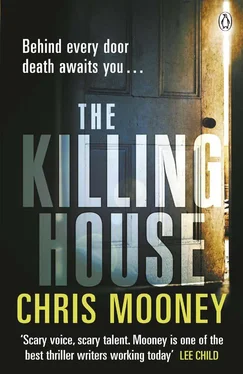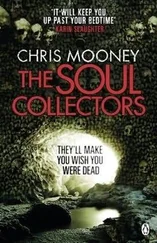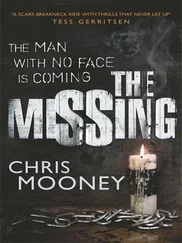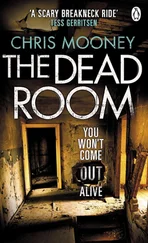Chris Mooney - The Killing House
Здесь есть возможность читать онлайн «Chris Mooney - The Killing House» весь текст электронной книги совершенно бесплатно (целиком полную версию без сокращений). В некоторых случаях можно слушать аудио, скачать через торрент в формате fb2 и присутствует краткое содержание. Жанр: Триллер, на английском языке. Описание произведения, (предисловие) а так же отзывы посетителей доступны на портале библиотеки ЛибКат.
- Название:The Killing House
- Автор:
- Жанр:
- Год:неизвестен
- ISBN:нет данных
- Рейтинг книги:5 / 5. Голосов: 1
-
Избранное:Добавить в избранное
- Отзывы:
-
Ваша оценка:
- 100
- 1
- 2
- 3
- 4
- 5
The Killing House: краткое содержание, описание и аннотация
Предлагаем к чтению аннотацию, описание, краткое содержание или предисловие (зависит от того, что написал сам автор книги «The Killing House»). Если вы не нашли необходимую информацию о книге — напишите в комментариях, мы постараемся отыскать её.
The Killing House — читать онлайн бесплатно полную книгу (весь текст) целиком
Ниже представлен текст книги, разбитый по страницам. Система сохранения места последней прочитанной страницы, позволяет с удобством читать онлайн бесплатно книгу «The Killing House», без необходимости каждый раз заново искать на чём Вы остановились. Поставьте закладку, и сможете в любой момент перейти на страницу, на которой закончили чтение.
Интервал:
Закладка:
Karim threaded his hands through his hair. ‘You and your goddamn logic,’ he muttered. Then, louder: ‘What’s that pragmatic brain of yours telling you about how Santiago was located?’
‘I can tell you he wasn’t wearing a tracking device.’
‘You checked his pockets?’
‘His pockets were empty.’
‘Shoes?’
‘He was barefoot,’ Fletcher said. ‘Tracking units are bulky items. If Santiago was wearing one, I would have found it.’
‘Then they must have used something else — something small, something that could have been sewn into Santiago’s clothing. Or his skin.’
‘His skin?’
‘How familiar are you with radio-frequency identification?’
‘I know the meat-packing industry uses RFID tags to identify a livestock’s herd of origin.’
Karim lit a cigarette. ‘Human applications have been devised,’ he said, cracking open his window. ‘A glass-encapsulated RFID chip slightly larger than a grain of rice can be tucked inside a pocket or sewn into clothing — or, in the case of biometric security, surgically inserted beneath the skin. The Mexican attorney general did that to his senior staff, had a chip implanted in that web of skin between your thumb and index finger. You notice anything like that on Santiago?’
‘The man had a number of scars,’ Fletcher said. ‘If I’m not mistaken, the RFID chip you’re referring to is no longer manufactured.’
‘You’re partly correct. The FDA approved the chips for human use in 2008. Then all these independent medical studies tested the glass-encapsulated chips on dogs and cats. They developed cancerous tumors, and the FDA revoked approval. The company that manufactured it — there was only one — went into bankruptcy, but then they received a godsend when the Indian government started a project to take every citizen’s fingerprints and iris scans, and store them on these tiny RFID chips so they could be identified.’
‘And the range of these chips?’
‘A couple of miles,’ Karim said. ‘All you need is a special antennae hooked up to a computer that has the right software. If you weren’t followed, Malcolm, then Santiago had to have been tagged with one of these RFID chips or some other type of hidden tracking device that emitted a signal powerful enough to allow his captors to pinpoint his location. It’s the only conceivable scenario.’
And one I failed to consider, Fletcher thought.
Karim propped an elbow on the door and massaged his forehead. In the silence that ensued, Fletcher contemplated what might have happened in Cape May. He surmised that Nathan Santiago had been removed from the premises. The question facing him was, had the woman and her partner decided to remain behind — or had they left people behind? They employed the services of at least two men: William Jenner and Marcus De Luca. Jenner’s home had been torched, but Fletcher couldn’t assume that either Jenner or his partner were dead. Were the former Baltimore patrolmen waiting at the Cape May house?
Fletcher considered tactics. Tall brush and scrub cedar bordered the driveway; even in daylight, the area would provide plenty of hiding spots where he could watch. With the downtown area a quarter of a mile away, an outside gunshot would sound no louder than a firecracker in the harsh ocean wind.
Shooting, however, would be foolish. Karim equipped all of his vehicles, even his personal ones, with bulletproof windows and special armour that could withstand a bomb.
‘How do you do it?’ Karim asked.
‘Do what?’
‘Unplug yourself from your emotions.’
‘I’m not uncaring, Ali.’
‘Looking at you — hearing you — I don’t get a sense that you’re… well, feeling anything.’
Fletcher didn’t answer.
They drove in silence.
‘Mathematics,’ Fletcher said.
‘I beg your pardon?’
‘The human body is nothing more than a complex energy system. It has a finite amount of resources. Focusing energy into endless speculation is a waste of time and, worse, a drain on mental resources. Better to channel my focus on the upcoming task.’
‘Malcolm,’ Karim said, drawing out the word, curls of smoke drifting from his nostrils, ‘there are times when I truly envy you.’
51
Fletcher insisted on making the final approach to the house alone. When he exited the car, he wanted Jenner, De Luca and whoever else was waiting in the house to think he’d come alone.
Karim’s Cape May home was on Whitney Avenue, a road that curved around a tall, sand-dusted hill upon which sat the house. It turned on to Greenview, the street that ran parallel to Whitney. Because of the narrow roads and the dangerous curve, street parking wasn’t allowed.
Fletcher took Greenview. Only one other home was near by, and both sides of the street were empty of vehicles. He drove where the road curved around a rocky shore and pulled onto Whitney. He saw no cars parked anywhere nearby. Fletcher drove past the driveway entrance for Karim’s home and continued straight ahead, looking for someone in a parked car and watching the beach house. He found no parked cars or people.
The small downtown area consisted of boutique stores, coffee houses, bistros and restaurants. The area was relatively quiet, given the winter season. A handful of people moved in and out of the various establishments, anxious to get out of the cold wind. A young white male bundled in a dark winter parka and wearing a charcoal-coloured woolly hat paced in front of a clothing store, smoking a cigarette and looking thoughtfully down the street, in the direction of Karim’s home.
Was he a spotter? Watching for someone to enter the driveway and then calling William Jenner? Fletcher checked all the cars parked in the meter spots along the street. They were mostly upscale models and they all had either New Jersey or New York plates. The vehicles were empty. The man he’d seen smoking tossed his cigarette into the wind and moved inside the store.
Fletcher pulled into a gas-station lot, turned and navigated his way back to the house. He handed the monocular to Karim.
‘When I reach the driveway, I want you to look for heat signatures in the surrounding brush before turning your attention to the house.’
Fletcher slowed and turned left. A slight bump and then the car climbed up the steep driveway. From the corner of his eye, he could see Karim’s pulse beating in his throat. His own heart rate remained unchanged.
Earlier, Karim had told him about the garage. With both remotes located inside the house, he had given Boyd Paulson a four-digit code to use on the keypad-entry system located on the outside of the garage. Reaching the top, Fletcher found the circular area clear and the garage-bay door hanging open, the black BMW parked inside. The door he’d entered last night — the porch door leading into the kitchen — was closed.
Karim searched the grounds with the monocular. Fletcher’s gaze swept the dunes, on the hunt for movement in the shaking brush and sea grass, the glint of a sniper scope — an unlikely scenario, but one he had to consider.
‘There’s no one out here,’ Karim said, and turned his attention to the house.
The garage, wide and windowless, was painted a dull white. The BMW was parked in the same spot it had been a few short hours ago. Fletcher’s roving gaze recorded what he saw now in the daylight, comparing these new images to the ones he had stored in his mind.
‘I’m not detecting any heat signatures inside the house,’ Karim said. ‘This device can see through a single wall but not multiple walls and floors, right?’
‘Correct.’ Fletcher pulled into the garage bay and looked at the security camera mounted in the right-hand corner, directly above the door leading to the portico that annexed the house. ‘The security camera’s light is blinking.’
Читать дальшеИнтервал:
Закладка:
Похожие книги на «The Killing House»
Представляем Вашему вниманию похожие книги на «The Killing House» списком для выбора. Мы отобрали схожую по названию и смыслу литературу в надежде предоставить читателям больше вариантов отыскать новые, интересные, ещё непрочитанные произведения.
Обсуждение, отзывы о книге «The Killing House» и просто собственные мнения читателей. Оставьте ваши комментарии, напишите, что Вы думаете о произведении, его смысле или главных героях. Укажите что конкретно понравилось, а что нет, и почему Вы так считаете.












